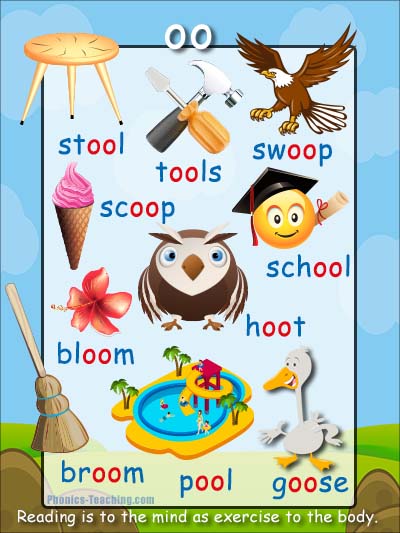English[edit]
Oo- definition, a combining form meaning “egg,” used in the formation of compound words: oogamous. Let's sound out some 'oo' words! If you want your children to sound out by themselves, simply mute the video.🚨 SUBSCRIBEhttps://www.youtube.com/littlelearne.
WikipediaEtymology 1[edit]
Representation of a long-o sound.
Noun[edit]
oo (pluraloos)
- (obsolete) The Greek letter omega.
Etymology 2[edit]
From Hawaiian‘ō‘ō, resembling its call.
Pronunciation[edit]
- (UK)IPA(key): /ˈəʊəʊ/
- (US)IPA(key): /ˈoʊoʊ/
Noun[edit]
oo (pluraloos)
- Any of four Hawaiian birds of the genus Moho, formerly classed with the honeyeaters and now believed to be extinct. [from 19th c.]
- 1898, Liliuokalani, Hawaii's Story by Hawaii's Queen:
- On this visit I made careful inquiries as to the success of Mr. Gay's efforts to raise the 'Oo' bird on this island.
- 2012, Julia Flynn Siler, Lost Kingdom, Grove Press, p. 161:
- Several years earlier, she had arranged to bring three pairs of the rapidly vanishing ‘ō‘ō bird from Hawai‘i island to Kaua‘i, hoping they would form a new colony.
- 1898, Liliuokalani, Hawaii's Story by Hawaii's Queen:
Synonyms[edit]
- moho, hoohoo
Translations[edit]
|
|
Etymology 3[edit]
See ooh.
Interjection[edit]
oo
- Alternative form of ooh
Cebuano[edit]
Interjection[edit]
oo
Antonyms[edit]
Chickasaw[edit]
Verb[edit]
oo (stative, irregular)
- to be (something)

Usage notes[edit]
- It replaces the use of ya in sentences where a Class II subject marker cannot be used. It never takes any subject markers.
- It cannot be used alone and must always be used with verb endings such as -tok, -taam, -a'chi, etc.
- For the future tense, a'chi can be used as a standalone word rather than a suffix completely replacing the use of a verb and having the meaning 'will be'. Similarly, a'ni, 'might be' could possibly work in a similar fashion, replacing the presence of an explicit verb as well, although it is not normally used in sentences expressing being something.
- The prefix hoo- is never used with any forms of the verb 'to be' (ya, oo, a'chi).
- To ask questions such as 'Is it a/an....', see the entries for the noun suffixes -to̠ (used after consonants) and -hto̠ (used after vowels).
Synonyms[edit]
Estonian[edit]
Noun[edit]
oo (genitive[please provide], partitive[please provide])
- The name of the Latin-script letter O.
Finnish[edit]
Pronunciation[edit]
- IPA(key): /ˈoː/, [ˈo̞ː]
- Rhymes: -oː
- Syllabification: oo
Etymology 1[edit]
From Latinō.
Noun[edit]
oo
- The name of the Latin-script letter O.
Declension[edit]
Inflected forms are often substituted with corresponding form of o-kirjain(“letter o”)
| Inflection of oo (Kotus type 18/maa, no gradation) | |||
|---|---|---|---|
| nominative | oo | oot | |
| genitive | oon | oiden oitten | |
| partitive | oota | oita | |
| illative | oohon | oihin | |
| singular | plural | ||
| nominative | oo | oot | |
| accusative | nom. | oo | oot |
| gen. | oon | ||
| genitive | oon | oiden oitten | |
| partitive | oota | oita | |
| inessive | oossa | oissa | |
| elative | oosta | oista | |
| illative | oohon | oihin | |
| adessive | oolla | oilla | |
| ablative | oolta | oilta | |
| allative | oolle | oille | |
| essive | oona | oina | |
| translative | ooksi | oiksi | |
| instructive | — | oin | |
| abessive | ootta | oitta | |
| comitative | — | oineen | |
| Possessive forms of oo (type maa) | ||
|---|---|---|
| possessor | singular | plural |
| 1st person | ooni | oomme |
| 2nd person | oosi | oonne |
| 3rd person | oonsa | |
Etymology 2[edit]
Verb[edit]

oo
- spoken language form of ole(“imperative and connegative form of olla - to be”)
- Mä oon sitten ruma! — Etkä oo!
- I'm so-o ugly! — No, you are not!
- Oo nyt vähän aikaa paikallas!
- Be still for a moment, will you!
Ingrian[edit]
Pronunciation[edit]
- IPA(key): /oː/
Verb[edit]
oo
- presentactiveindicativeconnegative of olla

Manx[edit]
Pronunciation[edit]
- IPA(key): /u/, /uː/
Etymology[edit]
From Old Irishtú, from Proto-Celtic*tū, from Proto-Indo-European*túh₂.
Pronoun[edit]
oo (emphaticuss)
- you(singular, informal)
Middle English[edit]
Etymology 1[edit]
From Old Englishān.
Article[edit]
oo
- a, one
- c.1384, John Wycliffe, Wycliffe's Bible (translation from the Vulgate), Genesis 11:1:
- Forſoþe þe erþe was of oo lip, and of þe ſame wordis.
- Truly the earth was of one tongue, and of the same words.
Etymology 2[edit]
A rendering of Ancient Greekὦ(ô, interjection).
Particle[edit]
oo
- Alternative form of O.
Ojibwe[edit]
Particle[edit]
oo
- oh!
- 'Oo, yay,' ikido, 'azhigwa onjigaawan iniw mitigoon.'
- 'Oh, my,' she said, 'those trees are running now.'
References[edit]
- The Ojibwe People's Dictionary https://ojibwe.lib.umn.edu/main-entry/oo-pc-disc
Scots[edit]
Pronunciation[edit]
- IPA(key): /u/
Etymology 1[edit]
From Old Englishwull.

Noun[edit]
oo (pluraloosoroose)
- (in the plural)fluff
Etymology 2[edit]
From we; of Old English origin.
Pronoun[edit]
oo (personal pronoun, non-emphatic)
- (South Scots)we
- (South Scots)us
Somali[edit]
Conjunction[edit]
oo
Tagalog[edit]
Alternative forms[edit]
Pronunciation[edit]
Oofos
- IPA(key): /ˈoːʔo/
Interjection[edit]
oo
- (informal)yes
Antonyms[edit]
Võro[edit]
Noun[edit]
oo (genitive[please provide], partitive[please provide])
- The name of the Latin-script letter O.
Inflection[edit]
Ooni Pizza Oven
This noun needs an inflection-table template.
Yami[edit]
Noun[edit]
oo
- (anatomy)head
Oompaville
